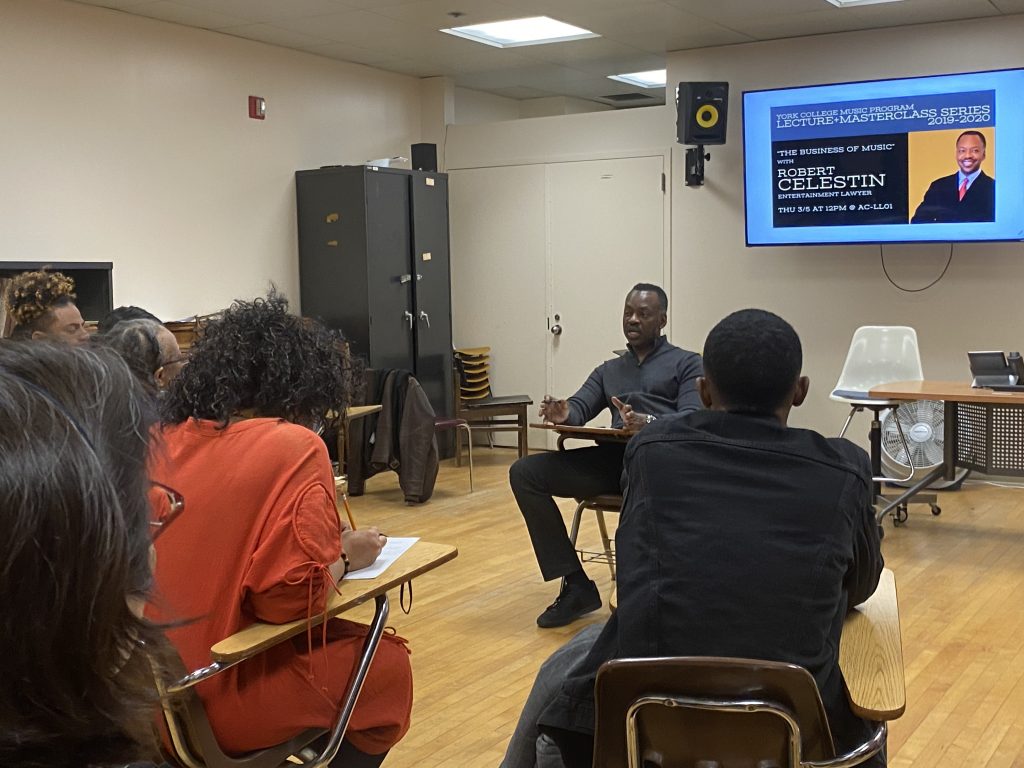By Asar John
From everyday terms such as “copyright” and less common ones such as “split sheets,” entertainment lawyer Robert Celestin came to York on March 5 for the first Masterclass and Lecture of the semester to discuss “The Business of Music”.
Celestin describes “The Business of Music” as covering several aspects that include, legal issues, the creation, use, and advertising of music. At the lecture, which acted more like a discussion, Celestin encouraged students to ask any questions they had related to the music entertainment industry.
“I learned that you have to be adamant in this industry and ask these questions and not be afraid,” says senior, Leonna Prithwipaul, a music production major.
Prithwipaul also mentions how the lecture was helpful in knowing what information she needs to take advantage of while managing her own band, Asana. One piece of information Celestin mentions to Prithwipaul includes a “band agreement,” which outlines how a copyright will be split among members of a band.
“At the end of the day, it’s probably best to register yourself with copyright.gov because when it comes to music it’s so hard to prove who took what, and when you have that it’s almost definitive,” says Prithwipaul.
Throughout the discussion, Celestin often stresses the importance of artists putting this copyright on their music.
“At minimum, they should understand the importance of registering the copyright to their music,” says Celestin.
After the talk, some students began to have a different outlook on the music industry itself.
“I was under the impression that radio stations didn’t seem to be as prominent as they used to be 20 years ago, but they still are very prominent and necessary today,” says senior, Deggra Stratton, a music major. “They have different areas of radio online that work just the same way as FM and AM radio stations.”

Celestin discusses how the same mediums of radio online have changed the industry from when he first entered it.
“The music business model was an ownership model,” says Celestin. “You’re Michael Jackson or Stevie Wonder and I would go and purchase your music and own it, whether it was a CD, or a vinyl, or a cassette tape, I would own your music.
Celestin says that streaming changed that to an all access model, where for a set price of a monthly subscription, one would have access to an artist’s music.
“I can go and listen to music from the 30s, 40s, 50s, etc., so that is one of the big fundamental changes in the music industry,” says Celestin. “I no longer own the music, I have access to it.”
Celestin, who is a graduate from Yale and Columbia, not only stresses the importance of knowing the ways of the music industry but also brings his experience from being on the radio at Yale and uses his experience to speak to York students to stress the importance of going to school.
“School really put me on my life’s path,” says Celestin. “Had I not been going to Yale, I don’t know what I’d be doing right now. At Yale, I got exposed to radio by being on the radio, then got exposed to record label executives that suggested I go to law school.”
The March 5th Masterclass/Lecture isn’t the first time Celestin has spoken at York. According to music Professor Mark Adams, Celestin spoke at another lecture to music students in 2011. This led to both Adams and The Director of the Music Program at York, George Lam, to bring the entertainment lawyer in for a second time around.
According to his website, raclawfirm.com, since starting his career in 1986, Celestin has worked at various record labels with various positions such as staff attorney and general manager.
The next Masterclass/Lecture this semester is scheduled for April 21, featuring two musical theater creators, Melissa Li and Kit Yan. However, due to the cancellation of all public events on campus because of the coronavirus pandemic, details on the event are pending.

